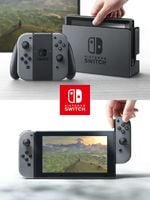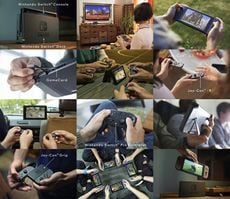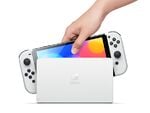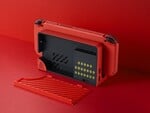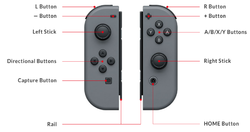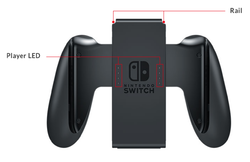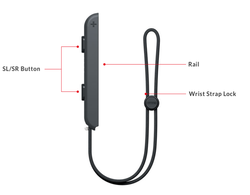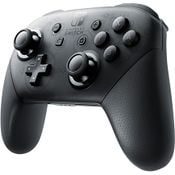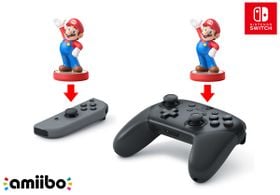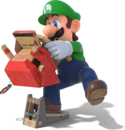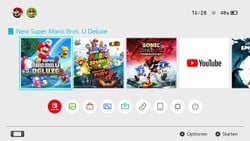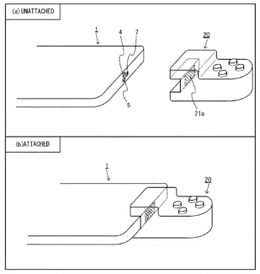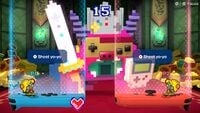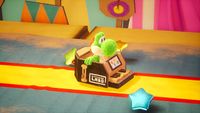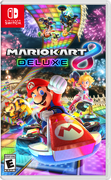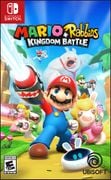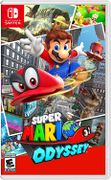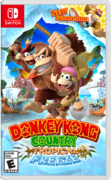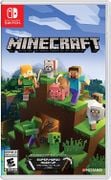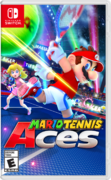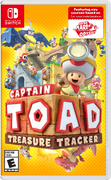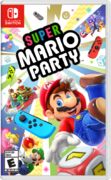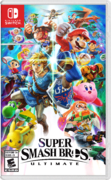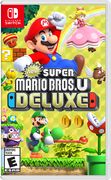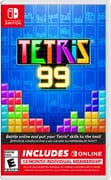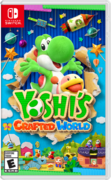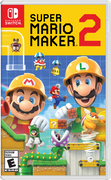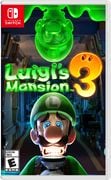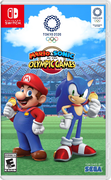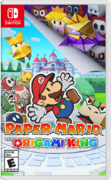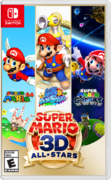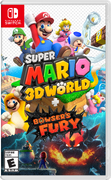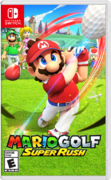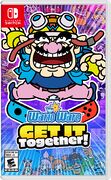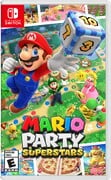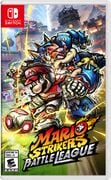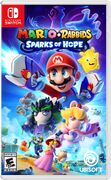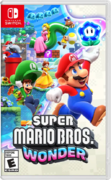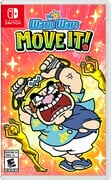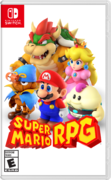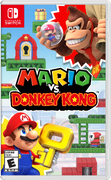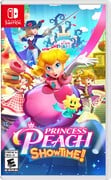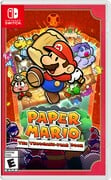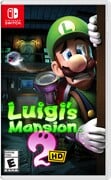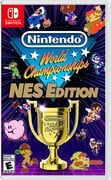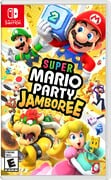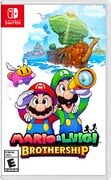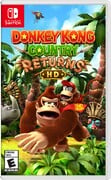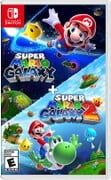Nintendo Switch
- "Switch" redirects here. For other uses, see Switch (disambiguation).
| Nintendo Switch | |
|---|---|
 Official logo 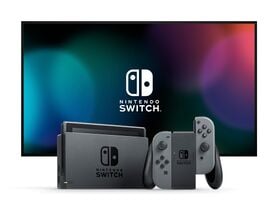 TV mode 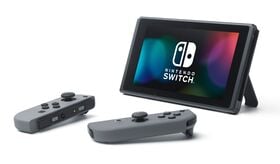 Tabletop mode 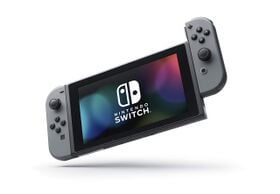 Handheld mode | |
| Generation | Eighth generation |
| Release dates | Nintendo Switch Lite: |
| Discontinued | HAC-001 August 2019 HAC-001(-01) N/A HDH-001 N/A HEG-001 N/A [?] |
| Predecessors | Nintendo 3DS Wii U |
| Successor | Nintendo Switch 2 |
- “Switch and Play”
- —Advertising slogan for the Nintendo Switch
- “Anytime, Anywhere, with Anyone”
- —Alternative advertising slogan for the Nintendo Switch
The Nintendo Switch, or simply the Switch, is a hybrid video game console released by Nintendo. It is Nintendo's seventh major home game console as the successor to the Wii U and its eighth handheld game console, after the Nintendo 3DS. The system is both a home console and a handheld console.[38] During development, the console was codenamed "NX".[39] It was officially announced on October 20, 2016,[40] and was released simultaneously on March 3, 2017, in Japan, America, Europe, Hong Kong, and other territories.[41] It costs US $299.99 in America and JP ¥29,980 in Japan.[41] A Nintendo Switch presentation containing more information about the system was live-streamed on January 13, 2017, at 04:00 AM to 05:05 AM UTC.[42][41] The Nintendo Switch had a hands-on event on six separate Sundays in six different cities across America prior to its release date,[41] along with Tokyo Big Sight, Japan.[41] Preorder retail reservations started on January 21, 2017, in Japan.[41] The Nintendo Switch has been a commercial success, and it is often credited with bringing Nintendo back to financial relevance following the Wii U's disappointing sales.[43] The Nintendo Switch and its peripherals have made multiple appearances in the Super Mario franchise.
The Nintendo Switch's successor, the Nintendo Switch 2, was officially revealed on January 16, 2025, and released later that year on June 5.[44]
Features
The Nintendo Switch is an LCD tablet-like console that is designed to be a hybrid between home and handheld systems, and the system can be played in three different styles: TV mode, tabletop mode, and handheld mode.[45] In TV mode, the system is plugged into a "Nintendo Switch Dock".[46] With the system docked, gameplay footage is displayed on the TV screen. With the console detached, the footage is displayed on the console's screen. When a player uses tabletop mode, the console uses a built-in kickstand to prop the system up. When the console is in handheld mode, the two "Joy-Con" controller pods are attached to the sides of the console, giving it a similar design to the Wii U's GamePad. The Joy-Con can also be removed and used as separate controllers, used as one controller together, or optionally docked into the "Joy-Con Grip"[46] to give a more traditional experience.
The Nintendo Switch console uses "game card" cartridges resembling those used for Nintendo DS and Nintendo 3DS units. The Nintendo Switch has built-in Wi-Fi,[41] Bluetooth 4.1 connectivity (with sound support since the version 13.0 update), a multi-touch capacitive touchscreen of 6.2 inches diagonally,[41] a resolution of 1080p on TV mode and 720p on tabletop and handheld modes, a USB Type-C connector[41] (used for docking, charging, driverless USB-C speakers, and direct Pro Controller connections), internal storage of 32 GB, a microSD slot (which also supports microSDHC/SDXC cards up to 2 TB; ejecting the card during use will forcibly turn off the Switch), a 3.5mm headphone jack, a brightness sensor, two speakers in the bottom, and a battery life ranging anywhere between 2.5 to 6.5 hours.[41] For example, battery life during The Legend of Zelda: Breath of the Wild gameplay is three hours.[47]
Players can also link up to eight multiple consoles to play against each other via local multiplayer.[41] Each Joy-Con can be used for two-player co-op, dubbed by Nintendo as "sharing the joy".[41]
Due to being both a home console and a handheld console, the Nintendo Switch is the first one-screen dedicated handheld since the Game Boy Micro in 2005.
Nintendo Switch Dock
The official Nintendo Switch Dock that is packaged with the original version and extended battery version has three USB 2.0 ports, an HDMI output,[41] an AC adapter port, and a TV output LED light. It supports USB Ethernet adapters that use the AX88179 (certain 1Gb/s adapters) or AX88772 (certain 100Mb/s adapters) chipsets, the latter of which had its support carried over from the Wii and Wii U.
The later dock model that is packaged with the OLED model includes an Ethernet port by default.
Language and region support
The Nintendo Switch does not have region-locking (except the mainland China model),[48] similar to Nintendo handhelds prior to the Nintendo DSi, and features enhanced language and region accessibility. The system can be changed to any of twelve languages available at launch:
|
|
Simplified Chinese, Traditional Chinese and Korean were added as languages on January 29, 2019,[49] while Brazilian Portugese was added as a language on December 1, 2020.[50]
There are five different region codes that the user can select from: Japan, The Americas, Europe, Australia/New Zealand, and Hong Kong/Taiwan/South Korea.[51] The Hong Kong/Taiwan/South Korea option was added on April 15, 2019. Depending on the region code chosen, the dialect for the English, French and Spanish languages will also change (e.g., setting the region code to Europe or Australia/New Zealand and the language to English sets the overall language to British English, while setting the region code to The Americas, Japan, or Hong Kong/Taiwan/South Korea and the language to English sets the overall language to American English). As of December 1, 2020, setting the region code to The Americas and the language to Portuguese sets the overall language to Brazilian Portuguese.[50]
The mainland China (Tencent) model is region-locked, and users cannot change their region (China) or language (Simplified Chinese). It plays import cartridges, but it does not support online multiplayer on import games or non-China eShop access. China-region cartridges cannot be played on other Nintendo Switch models.[48]
Hardware revisions
Nintendo Switch Lite
The Nintendo Switch Lite (model number HDH-001) is the second version of the Nintendo Switch, announced on July 10, 2019 and released worldwide on September 20, 2019. Unlike the original, this console is smaller and is handheld only, lacking the ability to be docked. This console can only play games that support handheld mode. Games that require use of motion controls (e.g. Super Mario Party) are not supported due to absence of the IR Motion Camera (though regular Joy-Con controllers can be connected to play these games). The directional buttons are also replaced by a single directional pad. Due to only being able to play in handheld mode, the Nintendo Switch Lite can only render games at a maximum output resolution of 720p.
Extended battery revision
On July 17, 2019, Nintendo announced a slightly enhanced version of the Nintendo Switch with the model number HAC-001(-01), which is identical to the original in appearance but sports substantially longer battery life; whereas an original Nintendo Switch has only 2.5 to 6.5 hours of battery life, this version has 4.5 to 9 hours of battery life. It was first released on August 13, 2019.[52] Like its original revision, this extended battery revision is both a home console and a handheld console.[38]
Nintendo Switch – OLED Model
The Nintendo Switch – OLED Model (model number HEG-001) is an enhanced revision of the Nintendo Switch that was announced on July 6, 2021, and features a 7-inch OLED screen, a wider and adjustable stand, enhanced audio, a wired LAN port built into the dock, and 64 GB of internal storage. It was released on October 8, 2021, and is available in white and neon blue/neon red.[36] Like the original model and its extended battery revision, the Nintendo Switch – OLED Model is both a home console and a handheld console.[53]
In the Super Mario Bros. Wonder Direct on August 31, 2023, Nintendo revealed a Mario Red Edition of the OLED Model, which features a silhouette of Mario printed on the bottom left on the back of the dock, and coins printed on the port station behind the dock's back cover. It was released on October 6, 2023.[54]
Peripherals
Joy-Con
The two Joy-Con have an accelerometer and gyro sensor.[41] The Joy-Con (R) has an IR motion camera that can sense and measure the real-time shape, motion, and distance of objects.[41] Two and
shoulder buttons are on each Joy-Con,[41] which can be only be pressed while the Joy-Con are not connected to anything other than straps. The Joy-Con can be slid into the Joy-Con Grip on the controllers' rails.[41] The Joy-Con launched with two color sets: the standard gray, along with neon blue and neon red.[41] Neon yellow Joy-Con were released on June 16, 2017, and neon pink and neon green Joy-Con were released on January 5, 2018.[55] Much like the Wii Remote, each Joy-Con has gray, detachable wrist straps with slide locks,[41] with other wrist strap colors sold separately.[41] Neon purple and neon orange Joy-Con were released on October 4, 2019.[56] Aside from just neon colors and gray, Joy-Con are available in standard blue, Mario-themed red, and Luigi-themed green colors.[56] An "HD Rumble" feature for high definition haptic feedback is included in the Joy-Con, which can convey realistic effects.
The Joy-Con (L) has a capture button that can take a screenshot of gameplay, which can be saved onto the system's Album, and can later be edited and uploaded to social media. A Nintendo Switch 4.0.0 update on October 19, 2017 added the capacity to record real-time gameplay of up to 30 seconds and allow that to also be uploaded to social media.[41] The Joy-Con (R) contains a built-in camera for taking pictures and recording video.
Buttons
- Release buttons
- Sync buttons
- Volume buttons
- Power
- Names in other languages
| Language | Name | Meaning | Notes |
|---|---|---|---|
| French | Joy-Con[?] | - | |
| Spanish (Latin American) | Controles Joy-Con[?] | Joy-Con Controllers |
Nintendo Switch Pro Controller
The Nintendo Switch Pro Controller[46] is a more traditional controller with a D-pad replacing the
directional buttons of the Joy-Con (L). The Pro Controller features the same set-up as the Nintendo GameCube Controller, with
placed below the face buttons. The Nintendo Switch Pro Controller includes an NFC touchpoint between
(Plus) and
for reading and writing amiibo figures and amiibo cards, and is sold separately.[41]
- Names in other languages
| Language | Name | Meaning | Notes |
|---|---|---|---|
| French | Manette Nintendo Switch Pro[?] | Nintendo Switch Pro controller | |
| Portuguese (Brazilian) | Controle Pro Nintendo Switch[?] | Nintendo Switch Pro Controller | |
| Spanish (Latin American) | Control Pro de Nintendo Switch[?] | Nintendo Switch Pro Controller |
amiibo
- Main article: amiibo
The Nintendo Switch has amiibo support.[57] The Joy-Con (R), Nintendo Switch Pro Controller, and Nintendo Switch Lite, all have an NFC touchpoint for reading and writing amiibo figures and amiibo cards.[41][58]
Nintendo Labo
Nintendo Labo is a do-it-yourself cardboard toy platform for the Nintendo Switch, primarily targeted at children.[59] Players insert the Nintendo Switch console and Joy-Con in cardboard constructions (collectively referred to as "Toy-Con"), which are compatible with certain games.[60] First shown in January 2018, the Toy-Con themselves were released on April 20, 2018 as either a variety kit for US $69.99[61] or a stand alone robot suit for US $59.99.[62] The customization set for Nintendo Labo includes stickers of eyes of various Nintendo characters, including, but not limited to, Mario, Peach, Goomba, Boo, and Bowser.
As of the version 1.5.0 update on June 26, 2018, Mario Kart 8 Deluxe can be played with the Toy-Con Motorbike. Mario Kart 8 Deluxe can also be played with the Toy-Con Car, Pedal, and Key as of the game's version 1.7.0 update.
Through the version 1.3.0 update, Super Mario Odyssey includes a VR experience that uses the Nintendo Labo Toy-Con VR Goggles, and includes three mini-missions taking place in the Cap Kingdom, Seaside Kingdom, and Luncheon Kingdom.[63]
The Nintendo Switch version of Captain Toad: Treasure Tracker became compatible with the Toy-Con VR Goggles through the version 1.3.0 update, which features a mode where the player can play VR versions of four of the game's levels: Episode 1 Prologue, Walleye Tumble Temple, Briny Bowl Swimming Hole, and Mine Cart Tunnel Throwdown.[64]
GameCube Controller Adapter
As of version 4.0.0, the GameCube Controller Adapter originally developed for the Wii U can also be used for compatible games on the Nintendo Switch such as Super Smash Bros. Ultimate, allowing the user to connect up to four Nintendo GameCube Controllers. Like on the Wii U, there are two USB ports on the Switch dock into which the adapter is plugged. All games recognize GameCube Controllers as wired Nintendo Switch Pro Controllers without motion controls, with the exceptions of Super Smash Bros. Ultimate and the Super Mario Sunshine remaster in Super Mario 3D All-Stars (as of the version 1.1.0 update), both of which have native GameCube Controller support.
Mappings
| Pro Controller | GameCube Controller |
|---|---|
| (None) |
The lack of equivalents to several of the Nintendo Switch Pro Controller's buttons results in limited functionality in some games, though it can be partially mitigated with the Nintendo Switch's internal button re-mapping settings. In Luigi's Mansion 3, Luigi cannot blow with the Poltergust G-00, and in Captain Toad: Treasure Tracker, the player cannot enter the pause menu or make the camera move behind the player. Many other games remain fully playable by default, including, but not limited to, Mario Kart 8 Deluxe, Paper Mario: The Origami King, and Princess Peach: Showtime!
USB mouse
A USB computer mouse can be plugged into one of the USB ports of the Nintendo Switch, replacing left stick input to allow more precise cursor movements in games that support it and, in the case of SNES games, emulating the Super NES Mouse. The only Super Mario-related games compatible with a USB mouse are Mario Paint, Mario's Super Picross, and Mario & Wario on the Super Nintendo Entertainment System - Nintendo Classics service.
Software
Software for Nintendo Switch can be purchased from retail and/or Nintendo eShop (in addition, some software can be downloaded from eShop for free). The Nintendo Switch is the first major home console since the Nintendo 64 to have retail software stored on cartridges rather than discs.
Nintendo Switch Online
- Main article: Nintendo Switch Online
Nintendo Switch Online is a subscription service that grants players online play for compatible Nintendo Switch games, which launched on September 18, 2018 in North America,[65] and on September 19, 2018 in Japan, Europe, and Oceania.[66][67][68] Prior to its launch, players were able to play online at no charge during a "free trial" period, after which they must pay a subscription fee for a plan lasting in increments of one month, three months, or 12 months. A week long trial period is available to use, after which payment will automatically begin renewing for the specified plan unless auto-renewal is turned off. The Nintendo Switch is also able to synchronize with smartphones via an application of the same name; this allows for online capability to invite friends to play online, set play appointments, and voice chat with friends on online matches.[41] Subscribers can also find Nintendo Switch Online-specific news and information in an application of the same name on the Switch's home menu. Standard online features such as the Nintendo eShop and system updates do not require a Nintendo Switch Online subscription to access.
Nintendo Switch Parental Controls
The Nintendo Switch also uses optional parental controls, being controlled from a smartphone via an application named Nintendo Switch Parental Controls, in order to control and monitor a minor's playing time, as well as restricting certain features of the Nintendo Switch. Nintendo has released a Super Mario–themed video featuring Bowser and Bowser Jr. detailing the functions of the application in multiple languages.
Nintendo eShop
- Main article: Nintendo eShop
The Nintendo eShop is the online storefront used for purchasing software and games on the Nintendo Switch. It was revealed during a small footage depicting the Nintendo Switch's system menu, which is available after a system update.[41]
Nintendo Switch HOME Menu
At the top of the Nintendo Switch's system menu, referred to as the HOME Menu,[69] there is/are (a) profile icon(s), a time display, a Wi-Fi/airplane mode status display, and a battery display. The middle portion includes grids for displaying games' icons, and the bottom has icons for applets including Nintendo Switch Online, News, Nintendo eShop, Album, Controllers, System Settings, and Sleep Mode, along with a controller display in the lower left.[41]
Development
The Nintendo Switch was codenamed the "NX" during development, though the codename was not believed to have meant anything in particular.[70] The development of the NX was first mentioned by Satoru Iwata on March 15, 2015 during Nintendo and DeNA's Business and Capital Alliance Announcement, where it was discussed how Nintendo was aiming to "construct a bridge between smart devices and dedicated video game hardware".[39] Later that year, the new Nintendo president Tatsumi Kimishima elaborated by saying that the NX was not going to be another version of the Wii or Wii U platforms, rather "something unique and different".[70]
In 2013, Nintendo chose to merge the handheld and home console development teams into a single Research & Development division,[71] due to the emerging possibility of integrating the software used by both platforms. Satoru Iwata said that it was important to "take advantage" of the established architecture of the Wii U while developing a future system, because of the ability to use common ways to program a handheld display and a full-size television display. At the time, Iwata stated that Nintendo was aiming to change the situation of developing separate versions of games for both handheld and console versions. He expressed interest in developing new hardware using the common programming of Android software, which would help alleviate the time taken to port the same game between separate handheld and home console releases.[71]
Yoshiaki Koizumi, the general producer of the Nintendo Switch console, made sure that the hardware development team included experience from "various different sections and disciplines", including both handheld and home console design.[72] He wanted to make sure that there was a high potential of "mixing and matching" those different areas of experience, to reach a single product. Many different hardware designs were proposed and considered, including a patented elliptical touch-screen controller capable of 3D display,[73][72] as well as a controller which uses a camera to sense the player's hand actions.[72] The NX's vision was to appeal to the on-the-go lifestyle of today's consumers, and adapt to their needs. This lead to the concept of "switching" between a home console and a handheld. However, during an interview with The Wall Street Journal, Reggie Fils-Aimé primarily referred the NX to mostly as a home console that can be played on the go, aside from being just a dedicated portable handheld system,[74] until the Nintendo Switch was eventually revealed on October 20, 2016 as both a home console and a handheld console.[40][38]
Shinya Takahashi, the general manager of the Entertainment Planning & Development Division at Nintendo, described how the early brainstorming stages focused on the essential functions of a portable home console.[72] The team also looked back at the accessibility and popularity of the Wii when developing the Switch, while still retaining features from other past Nintendo consoles, such as the handheld screen of the Wii U. Early on, it was also considered important for the system to come with two controllers that can be attached and brought on the go for two players to easily play together (in a similar way to how the Famicom docked two controllers on the system), although still providing a "full and satisfying single-player experience". Reggie Fils-Aime stressed the concept of "constant engagement" during Nintendo Switch planning, and appeal to an "anywhere, anytime, any way" approach.[75] The use of color was recognized to have been emphasized by Nintendo's systems in the past, notably with the Nintendo GameCube and Super Nintendo's multi-colored buttons. This inspired the use of red and blue Joy-Con for the Nintendo Switch, whereas the alternative gray design was aimed to appeal more to a "core gamer who is looking for something more sleek".[72]
A notable challenge during development was "packing" all of the required technology and features into the Joy-Con's desired weight and size, such as the IR Motion Camera, while still focusing on "communicating" the value of that technology through the software.[72] The HD Rumble, described by Yoshiaki Koizumi as a form of "virtual reality", required a lot of collaboration and trials between the hardware and software teams in order to utilize it within game design.
In 2015, Satoru Iwata spoke about how the need for region locking was not entirely due to consumer actions, but of the seller in global vendor licenses and different circumstances between countries. Iwata acknowledged that there were advantages for both the consumers and Nintendo in lifting region restrictions, and if future hardware were to use region-free games, then such problems would need to be pre-determined and subsequently solved.[76] On January 12, 2017, Nintendo announced during a livestream presentation that the Nintendo Switch's games will be region-free.[77]
The name "Nintendo Switch" was decided due to the ability to easily switch from a television screen to a handheld screen, as well as being akin to flipping a switch to "change the way people experience entertainment in their daily lives".[78]
Appearances in the Super Mario franchise
Super Mario Run
A docked Nintendo Switch with red and blue Joy-Con attached appears as a statue in Super Mario Run's Kingdom Builder mode. Tapping it shows the console being removed from the dock which the screen displays the key artwork from Mario Kart 8 Deluxe.
Donkey Kong Country: Tropical Freeze
In the Nintendo Switch port of Donkey Kong Country: Tropical Freeze, exclusively in Funky Mode, Donkey Kong may pick up a Nintendo Switch system and play it for a short while if the player leaves him idle. If Diddy Kong or Dixie Kong are mounted on his back, they will play together with DK; however, if Cranky Kong is mounted, he will instead read a newspaper. In Original Mode, Donkey Kong plays on a Nintendo 3DS instead.
WarioWare series
WarioWare Gold
The Nintendo Switch and two Joy-Con appear in the WarioWare Gold microgame Joy-Con Slide, where the object is sliding a Joy-Con into the system. A Nintendo Switch also appears as one of the various souvenirs the player can obtain from the Capsule Machine.
Additionally, in the Japanese version of "18 x 13", 18-Volt bets his Nintendo Switch if 13-Amp can beat him in a rap battle.
WarioWare: Get It Together!
In WarioWare: Get It Together!, blue and red Joy-Con appear as the platforms for players 1 and 2, respectively, in 9-Volt's stage.
WarioWare: Move It!
In WarioWare: Move It!, the Joy-Con controllers (known as the Form Stones in-game) appear as major objects in the game's story. Iconography of the Form Stones resembling the Nintendo Switch logo are seen around Caresaway Island, including on the masks worn by the Woods Watchers.
New Super Mario Bros. U Deluxe
In New Super Mario Bros. U Deluxe, a Nintendo Switch console with red and blue Joy-Con attached to it appears in the Records Toad House. Said console plays a music box version of the credits music while the credits are displayed.
Yoshi's Crafted World
In Yoshi's Crafted World, the player can unlock costumes based on the Nintendo Labo's Toy-Con RC Car, Piano, and Robot.
Super Mario games
Physical and digital games
2017
- Mario Kart 8 Deluxe
- Mario + Rabbids Kingdom Battle (Gold Edition, featuring Season Pass content, later released separately)
- Super Mario Odyssey
2018
- Donkey Kong Country: Tropical Freeze
- Minecraft: Bedrock Edition
- Mario Tennis Aces
- Captain Toad: Treasure Tracker
- Super Mario Party
- Super Smash Bros. Ultimate
2019
- New Super Mario Bros. U Deluxe
- Tetris 99
- Yoshi's Crafted World
- Super Mario Maker 2
- Luigi's Mansion 3
- Mario & Sonic at the Olympic Games Tokyo 2020
2020
- Paper Mario: The Origami King
- Super Mario 3D All-Stars
- Mario Kart Live: Home Circuit (free digital download that requires a physical peripheral to play)
2021
- Super Mario 3D World + Bowser's Fury
- Mario Golf: Super Rush
- WarioWare: Get It Together!
- Mario Party Superstars
2022
2023
2024
- Mario vs. Donkey Kong
- Princess Peach: Showtime!
- Paper Mario: The Thousand-Year Door
- Luigi's Mansion 2 HD
- Nintendo World Championships: NES Edition
- Super Mario Party Jamboree
- Mario & Luigi: Brothership
2025
Nintendo eShop–exclusive games
2017
- Minecraft: Nintendo Switch Edition
- Arcade Archives: Mario Bros.
- Arcade Archives: VS. Super Mario Bros.
2018
- Mario Tennis Aces: Online Tournament Demo
- Arcade Archives: Donkey Kong
- Nintendo Entertainment System - Nintendo Classics
- Arcade Archives: Donkey Kong Jr.
2019
- Arcade Archives: Donkey Kong 3
- Mario Tennis Aces: Special Online Demo
- Arcade Archives: Pinball
- Super Nintendo Entertainment System - Nintendo Classics
- Arcade Archives: VS. Golf
2020
2021
2023
2025
2026
2025
- Donkey Kong Bananza[79]
- Super Mario Party Jamboree – Nintendo Switch 2 Edition + Jamboree TV (local only)[80]
Game gallery
- For this subject's image gallery, see Gallery:Nintendo Switch.
Notes
- The Nintendo Switch is the first Nintendo console since the Nintendo GameCube not to be backwards-compatible with its immediate predecessor. However, many games have instead been ported over to the Nintendo Switch.
- The Nintendo Switch is the first Nintendo console to have more than one Paper Mario game developed for the system (in this case, Paper Mario: The Origami King and the Paper Mario: The Thousand-Year Door remake), although Super Paper Mario was originally developed for the Nintendo GameCube before becoming a Wii title. It is also the first system to have multiple Mario Kart titles (Mario Kart 8 Deluxe and Mario Kart Live: Home Circuit), and the first to have no new mainline Mario Kart game.
- The OLED model is the first Nintendo console to be released in the United Kingdom after its withdrawal from the European Union, which was finalized on January 31, 2020; the country had been a member of the EU and its predecessor group, the European Community, since 1973. Despite this, Nintendo UK's website still jointly serves the United Kingdom and the Republic of Ireland, the latter of which remains an EU member.
- The Nintendo Switch was the last Nintendo console to be officially released in Russia before Nintendo withdrew from the Russian market as a result of the Russian invasion of Ukraine.
- Mario vs. Donkey Kong is the first Super Mario game to omit the ESRB rating from its box art for the "MSE" region release (as of 2020, "MSE" region copies are officially distributed in Malaysia, the Philippines, Singapore, and Thailand, and by proxy are also widely sold in other Southeast Asia markets such as Indonesia), while the first overall game to omit the rating is Another Code: Recollection.[81] The final Super Mario and overall "MSE" release to feature the ESRB rating on the cover was the Mario Kart 8 Deluxe + Booster Course Pass bundle, which launched on December 1, 2023, for the Southeast Asian markets;[82] ironically, it is one of two Nintendo-published Nintendo Switch official physical game releases for Southeast Asia that have no North American equivalent. Despite the removal of the ESRB ratings from the covers, most game cards retain the ESRB rating and (except for Mario Kart 8 Deluxe + Booster Course Pass) the "USA" code.
References
- ^ Nintendo Switch. Nintendo of Singapore (English). Retrieved February 10, 2025.
- ^ February 20, 2017. "The weeks of waiting are now over! Pre-orders for the SWITCH are NOW OPEN at GEEKAY GAMES.". Geekay Games official Facebook page (English). Retrieved February 10, 2025.
- ^ Nintendo (January 13, 2017). Nintendo Switch launches on 3rd March!. Nintendo (official South African site) (English). Retrieved November 24, 2024. (Archived November 24, 2024, 23:43:36 UTC via Wayback Machine.)
- ^ Augusto Finocchiaro Preci (July 24, 2017). Nintendo Switch en Argentina: ¡Precio y fecha de lanzamiento oficial confirmados!. Cultura Geek (Spanish). Retrieved June 5, 2024. (Archived January 21, 2019, 03:14:56 UTC via Wayback Machine.)
- ^ 한국닌텐도 홈페이지. Nintendo of Korea (Korean). Archived September 20, 2017, 03:54:42 UTC from the original via Wayback Machine. Retrieved June 2, 2024.
- ^ 任天堂(香港)有限公司. Nintendo Taiwan (Traditional Chinese). Retrieved June 2, 2024.
- ^ Enes K. (July 24, 2018). Resmi Açıklama Geldi: Nintendo Switch Türkiye'de Satışa Çıkıyor. Webtekno (Turkish). Retrieved June 5, 2024. (Archived October 17, 2018, 00:20:49 UTC via Wayback Machine.)
- ^ Enes K. (July 27, 2018). Türkiye'de Satışa Sunulan Nintendo Switch ve Oyunlarının Fiyatı Belli Oldu. Webtekno (Turkish). Retrieved June 5, 2024. (Archived October 17, 2018, 04:29:23 UTC via Wayback Machine.)
- ^ Maxsoftonline (November 30, 2018). Nintendo Switch - Official Philippines Version will be released today! Do check out the following official retail outlets for availability!!. X (English). Retrieved June 5, 2024. (Archived via archive.today.)
- ^ March 12, 2019. לראשונה בישראל – תור גיימינג משיקה את נינטנדו בארץ ביבוא רשמ. IGN Israel (Hebrew). Retrieved June 5, 2024. (Archived May 15, 2019, 03:34:09 UTC via Wayback Machine.)
- ^ Nintendo Switch วางจำหน่าย:29 มีนาคม 2019 (ศุกร์). Nintendo of Thailand (Thai). Retrieved June 5, 2024. (Archived February 6, 2022, 13:48:05 UTC via Wayback Machine.)
- ^ Active Gulf (September 27, 2019). The Nintendo Switch is officially launched today in Oman!!. Facebook (English). Retrieved June 5, 2024. (Archived January 31, 2020, 06:15:56 UTC via Wayback Machine.)
- ^ ZhugeEX (December 3, 2019). The Tencent Nintendo Switch (Official Mainland China Ver.) will launch on December 10th 2019 for RMB 2,099 ($300). It will come bundled with New Super Mario Bros. U Deluxe and a 1 year warranty.. X. Retrieved June 2, 2024.
- ^ Nintendo Switch Released:17 January 2020, Friday. Nintendo of Malaysia (English). Retrieved June 5, 2024. (Archived April 7, 2022, 18:29:07 UTC via Wayback Machine.)
- ^ Veloso, Vinícius (September 4, 2020). Nintendo Switch será oficialmente lançado no Brasil no próximo dia 18 de setembro. Nintendo Blast (Brazilian Portuguese). Retrieved June 2, 2024.
- ^ Ольга Карпенко (October 26, 2021). Консоли Nintendo Switch будут официально продаваться в Украине. AIN (Russian). Retrieved March 2, 2025. (Archived April 18, 2024, 20:24:42 UTC via Wayback Machine.)
- ^ @NintendoAUNZ (July 10, 2019). Introducing #NintendoSwitchLite – a compact, lightweight system that's dedicated to handheld play! This new addition to the #NintendoSwitch family arrives on 20/09 in 3 different colours.. X (Australian English). Retrieved June 2, 2024.
- ^ July 10, 2019. 携帯専用「Nintendo Switch Lite」が9月20日に発売決定。8月30日より予約開始。. Nintendo (Japanese). Retrieved June 2, 2024.
- ^ Nintendo Switch Lite. Nintendo Korea (Korean). Retrieved June 2, 2024.
- ^ Nintendo Switch Lite. Nintendo HK (Traditional Chinese). Retrieved June 2, 2024.
- ^ Nintendo Switch Lite. Nintendo Taiwan (Traditional Chinese). Retrieved June 2, 2024.
- ^ Nintendo Switch Lite. Nintendo of Singapore (English). Retrieved June 1, 2024. (Archived February 4, 2024, 10:16:35 UTC via Wayback Machine.)
- ^ @NintendoEurope (July 10, 2019). Introducing #NintendoSwitchLite – a compact, lightweight console that's dedicated to handheld play! This new addition to the #NintendoSwitch family arrives 20/09 in 3 different colours.. X (British English). Retrieved June 2, 2024.
- ^ a b Consolas de la familia Nintendo Switch – Sito oficial. Nintendo (Chilean website) (Spanish). Retrieved June 10, 2024. (Archived June 8, 2024, 08:07:43 UTC via Wayback Machine.)
- ^ a b Consolas de la familia Nintendo Switch – Sito oficial. Nintendo (Colombian website) (Spanish). Retrieved June 10, 2024. (Archived June 8, 2024, 06:15:04 UTC via Wayback Machine.)
- ^ a b Consolas de la familia Nintendo Switch – Sito oficial. Nintendo (Peruvian website) (Spanish). Retrieved June 10, 2024. (Archived June 8, 2024, 08:07:49 UTC via Wayback Machine.)
- ^ @NintendoAmerica (July 10, 2019). A new addition of the #NintendoSwitch family will arrive on 9/20. With #NintendoSwitchLite, it’s compact and lightweight making it easy to take on the go!. X (American English). Retrieved June 2, 2024.
- ^ Nintendo Switch – OLED Model. Nintendo Australia (Australian English). Retrieved June 2, 2024.
- ^ Nintendo Switch(有機ELモデル). Nintendo (Japanese). Retrieved June 2, 2024.
- ^ July 7, 2021. OLED 디스플레이를 탑재한 Nintendo Switch(OLED 모델) 2021년 10월 8일 희망소비자가격 415,000원에 발매. Nintendo Korea (Korean). Retrieved June 2, 2024.
- ^ July 7, 2021. 配置OLED螢幕的Nintendo Switch(OLED款式)預定於2021年10月8日發售,建議售價HKD 2,680. Nintendo HK (Traditional Chinese). Retrieved June 2, 2024.
- ^ July 6, 2021. https://www.nintendo.tw/support/information/2021/210706/ 配置OLED螢幕的Nintendo Switch(OLED款式)預定於2021年10月8日發售,建議售價NTD 10,480(含稅). Nintendo Taiwan (Traditional Chinese). Retrieved June 2, 2024.
- ^ Nintendo Switch - OLED Model. Nintendo of Singapore (English). Retrieved June 1, 2024. (Archived February 4, 2024, 10:17:06 UTC via Wayback Machine.)
- ^ @NintendoMDE (October 8, 2021). Meet the newest member of the Nintendo Switch family.... Nintendo Switch OLED Model Neon Blue / Neon Red and Nintendo Switch OLED Model White are available in stores across UAE.. X (English). Retrieved June 13, 2024. (Archived October 9, 2021, 12:29:39 UTC via Wayback Machine.)
- ^ Nintendo Switch – OLED Model. Nintendo UK (British English). Retrieved June 2, 2024.
- ^ a b Nintendo Switch OLED Model and Metroid Dread are now available in stores. Nintendo of America (American English). Archived October 17, 2021, 14:44:18 UTC from the original via Wayback Machine. Retrieved June 2, 2024.
- ^ OLED版 - 腾讯Nintendo Switch官网. Tencent (Simplified Chinese). Retrieved June 2, 2024.
- ^ a b c "Nintendo Switch is designed to fit your life, transforming from home console to portable system in a snap." – Nintendo Switch. Nintendo of America (American English). Retrieved June 2, 2024.
- ^ a b "[...] let me confirm that Nintendo is currently developing a dedicated game platform with a brand-new concept under the development codename 'NX'." – Iwata, Satoru (March 17, 2015). Business and Capital Alliance Announcement. Nintendo (English). Retrieved June 2, 2024.
- ^ a b Nintendo of America (October 20, 2016). First Look at Nintendo Switch. YouTube (American English). Archived October 20, 2016, 14:01:34 UTC from the original via Wayback Machine. Retrieved June 2, 2024.
- ^ a b c d e f g h i j k l m n o p q r s t u v w x y z Nintendo of America (January 12, 2017). Nintendo Switch Presentation 2017. YouTube (American English). Retrieved June 2, 2024.
- ^ NintendoAmerica (October 26, 2016). Learn more about Nintendo’s new home gaming system at the Nintendo Switch Presentation, streamed LIVE on Jan. 12. X (American English). Retrieved June 2, 2024.
- ^ Conte, Niccolo (December 24, 2020). Switch to Success: 20 Years of Nintendo Console Sales. Visual Capitalist. Retrieved June 2, 2024.
- ^ Nintendo of America (April 2, 2025). Nintendo Direct: Nintendo Switch 2 – 4.2.2025. YouTube. Retrieved April 5, 2025.
- ^ Nintendo Switch™ Family. Nintendo. Retrieved November 28, 2024.
- ^ a b c October 20, 2016. Nintendo Switch world premier demonstrates new entertainment experiences from a home gaming system. Nintendo.com (English). Archived October 20, 2016, 14:50:17 UTC from the original via Wayback Machine. Retrieved June 2, 2024.
- ^ Technical Specs - Nintendo Switch™ - System hardware, console specs. Nintendo of America (American English). Retrieved June 2, 2024.
- ^ a b ZhugeEX (January 6, 2020). PSA for Nintendo Switch owners: Game cartridges released for the Tencent Nintendo Switch will not work on global Nintendo Switch consoles. For example, NSMBU Deluxe will be published on Jan 15th by Tencent in China. This cartridge will ONLY work on the Tencent Nintendo Switch.. X (English). Retrieved June 2, 2024.
- ^ How to Change the System Language. Nintendo.com (American English). Retrieved June 2, 2024.
- ^ a b Nintendo Support: Nintendo Switch System Updates and Change History. Nintendo.com (American English). Retrieved June 2, 2024.
- ^ https://en-americas-support.nintendo.com/app/answers/detail/a_id/22356/~/how-to-change-the-system-region How to Change the System Region. Nintendo.com (American English). Retrieved June 2, 2024.
- ^ Dunsmore, Kevin (August 13, 2019). The Updated Switch with Improved Battery Life is Available Now. Hardcore Gamer. Retrieved June 2, 2024.
- ^ "Nintendo Switch and Nintendo Switch – OLED Model systems are designed to fit your life, transforming from home console to portable system in a snap!" – Nintendo Switch – OLED Model. Nintendo of America (American English). Retrieved June 2, 2024.
- ^ Nintendo of America (August 31, 2023). Super Mario Bros. Wonder Direct 8.31.2023. YouTube. Retrieved August 31, 2023.
- ^ January 5, 2018. Keep your #NintendoSwitch looking fresh when you play #Splatoon2 with these new Neon Pink and Neon Green Joy-Con controllers! Look for them in stores later this month.. X. Retrieved June 2, 2024.
- ^ a b Gil, Lory and Spear, Rebecca (February 1, 2020). Every Color Nintendo Switch Joy-Con Controller in 2020. iMore. Archived January 20, 2021, 23:57:49 UTC from the original via Wayback Machine. Retrieved June 2, 2024.
- ^ Brian (October 20, 2016). Nintendo confirms amiibo support for Switch, says Dock is for TV output and charging. Nintendo Everything. Retrieved June 2, 2024.
- ^ amiibo UK (January 23, 2017). Whether you use a Joy-Con or Pro Controller, Nintendo Switch is fully compatible with your amiibo! The Legend of Zelda: Breath of the Wild and Mario Kart 8 Deluxe will both feature amiibo compatibility from launch! Look out for more announcements in the future.. British English. Retrieved June 2, 2024.
- ^ Nintendo (January 17, 2018). Tune in here on Facebook or at youtube.com/nintendo at 2 p.m. PT/ 5 p.m. ET to discover a new interactive experience for Nintendo Switch that’s specially crafted for kids and those who are kids-at-heart.. Facebook (English). Retrieved June 2, 2024.
- ^ January 21, 2018. [Nintendo Labo (Australia / New Zealand)]. Nintendo of Australia (Australian English). Archived January 20, 2018, 02:18:46 UTC from the original via Wayback Machine. Retrieved June 2, 2024.
- ^ Nintendo LABO Variety Kit. GameStop (English). Archived April 3, 2019, 21:03:01 UTC from the original via Wayback Machine. Retrieved June 2, 2024.
- ^ Nintendo LABO Robot Kit for Nintendo Switch. GameStop. Archived July 2, 2019, 18:52:38 UTC from the original via Wayback Machine. Retrieved June 2, 2024.
- ^ April 4, 2019. Experience 2 beloved games in new ways with the Toy-Con VR Goggles from the #NintendoLabo: VR Kit! https://labo.nintendo.com/kits/vr-kit/. X (American English). Retrieved June 2, 2024.
- ^ Nintendo of America (July 31, 2019). Nintendo Labo: VR Kit + Captain Toad: Treasure Tracker. YouTube (American English). Retrieved June 2, 2024.
- ^ Nintendo of America (September 12, 2018). #NintendoSwitchOnline memberships will start on 9/18. You can sign-up for a 7-day free trial from Nintendo #eShop at launch! We will introduce more information during the Nintendo Direct on 9/13.. X. Retrieved June 2, 2024.
- ^ Nintendo (September 12, 2018). 「Nintendo Switch Online」の正式スタート日は9月19日(水)に決まりました。正式スタート後は、ニンテンドーeショップにて7日間無料体験もご用意します。サービス内容については改めて「Nintendo Direct 2018.9.14」でご紹介します。. X (Japanese). Retrieved June 2, 2024.
- ^ Ninendo of Europe. The #NintendoSwitchOnline paid membership service will start on 19/09. You can sign-up for a 7-day free trial from Nintendo #eShop at launch! We will introduce more information during the #NintendoDirect on 14/09.. X (British English). Retrieved June 2, 2024.
- ^ NintendoAUNZ (September 12, 2018). The #NintendoSwitchOnline paid membership service will start on 19/09. You can sign-up for a 7-day free trial from Nintendo #eShop at launch! We will introduce more information during the #NintendoDirect on 14/09. 👉 https://nintendo.com.au/nintendo-switch/onlineservice/. X. Retrieved June 2, 2024.
- ^ Nintendo of America (March 1, 2017). Nintendo Switch - News & eShop. Retrieved April 18, 2025.
- ^ a b Peckham, Matt (December 3, 2015). 14 Things Nintendo President Tatsumi Kimishima Told Us. Time. Retrieved June 2, 2024.
- ^ a b Iwata, Satoru. Third Quarter Financial Results Briefing Ending March 2014: Question 5. Nintendo (English). Archived March 2, 2014, 03:52:10 UTC from the original via Wayback Machine. Retrieved June 2, 2024.
- ^ a b c d e f IGN (February 28, 2017). How Nintendo Made the Switch. YouTube (English). Retrieved June 2, 2024.
- ^ Byford, Sam (December 11, 2015). Wild Nintendo patent filing shows game controller made out of a screen. The Verge. Retrieved June 2, 2024.
- ^ King, Ashley (June 19, 2015). Reggie calls the Nintendo NX a home console. Wii U Daily. Archived from the original via Wayback Machine. Retrieved June 2, 2024.
- ^ Brian (March 1, 2017). Reggie on Switch. Nintendo Everything. Retrieved June 2, 2024.
- ^ Iwata, Satoru. Corporate Management Policy Briefing /Semi-Annual Financial Results Briefing for the 75th Fiscal Term Ending March 2015 - Q & A. Nintendo. Archived November 9, 2014, 11:17:54 UTC from the original via Wayback Machine. Retrieved June 2, 2024.
- ^ McWhertor, Michael (January 12, 2017). Nintendo Switch will be region-free. Polygon. Retrieved June 2, 2024.
- ^ Brian (December 6, 2016). Nintendo on Switch’s name. Nintendo Everything (English). Retrieved June 2, 2024.
- ^ Nintendo of America (June 18, 2025). Donkey Kong Bananza Direct 6.18.2025. YouTube. Retrieved June 19, 2025.
- ^ GameShare. Nintendo. Retrieved June 19, 2025.
- ^ Iggy. All First Party Nintendo Physical Games In Southeast Asia Will Not Have A Rating On The Cover Starting From Another Code. Nintendo Soup. Retrieved June 2, 2024.
- ^ November 16, 2023. The complete edition with all 96 courses available. Mario Kart™ 8 Deluxe + Booster Course Pass, launching on 1 December 2023.. Nintendo Singapore website. Retrieved June 16, 2024.
External links
- Official Japanese website
- Official American website
- Official British and Irish website
- Official Oceanian website
- Official Korean website
- Official Hong Kongese website
- Official mainland Chinese website
